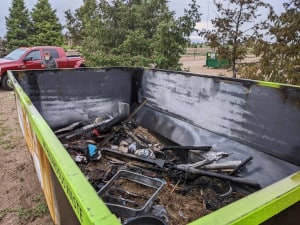Proper waste disposal is crucial for protecting our environment and ensuring the safety of waste management workers. While dumpsters serve as convenient solutions for many types of waste, certain materials must never be placed in them due to their potential hazards and environmental impacts.
Hazardous Materials and Chemicals
Paints and Solvents
Oil-based and lead-based paints, along with their associated thinners and solvents, pose significant environmental risks. These materials can leach into groundwater and contaminate septic systems when improperly disposed of. When these substances seep into soil and water tables, they can create long-lasting environmental damage and potentially harm wildlife and human health.
Pesticides and Chemicals
Chemical products, including pesticides, herbicides, and fertilizers, require specialized disposal methods. These substances can:
- Contaminate soil and groundwater systems
- Harm beneficial insects and wildlife
- Create toxic runoff that affects local ecosystems
- Pose risks to waste management workers
Electronic Waste (E-Waste)
Electronic devices contain numerous hazardous components that become dangerous when broken down in landfills. Common e-waste items include:
Computers and Monitors
These devices contain heavy metals and toxic materials that can leach into soil and groundwater. Proper disposal through certified e-waste recycling centers ensures these materials are safely processed.
Televisions and Appliances
Modern appliances often contain electronic components and chemicals that become hazardous when not disposed of properly. Additionally, appliances containing Freon present special challenges, as this greenhouse gas can cause significant environmental damage if released.
Automotive and Industrial Materials
Oils and Fuels
Automotive fluids, including motor oil, gasoline, and lubricants, are strictly prohibited from dumpster disposal. These materials are:
- Highly toxic and corrosive
- Flammable and potentially explosive
- Capable of contaminating large volumes of groundwater
- Often illegal to dump in most jurisdictions
Tires and Batteries
Vehicle tires and batteries require specialized disposal methods. Tires can trap methane gas in landfills and create fire hazards, while batteries contain corrosive materials and heavy metals that can contaminate soil and water sources.
Medical and Biological Waste
Medical waste presents unique hazards and must never be placed in standard dumpsters. This includes:
- Sharps and needles
- Prescription medications
- Biomedical and infectious materials
- Blood products
- Pathological waste
These materials require specialized handling to prevent the spread of disease and protect public health.
Construction and Industrial Materials
Asbestos
Asbestos-containing materials pose severe health risks when disturbed. Even slight disturbance can release dangerous fibers into the air, potentially causing deadly lung diseases like mesothelioma. These materials require specialized containment and disposal protocols.
Railroad Ties
Railroad ties are treated with harmful chemicals like creosote and arsenic. When disposed of improperly, these chemicals can:
- Leach into soil and groundwater
- Harm local ecosystems
- Create long-term environmental contamination
- Pose risks to human health
Environmental Impact Considerations
Water Contamination
Many prohibited materials can contaminate water sources through:
- Direct leaching into groundwater
- Runoff into surface water
- Contamination of soil that eventually reaches water tables
Air Quality
Certain materials can impact air quality through:
- Release of volatile organic compounds
- Generation of toxic fumes
- Creation of airborne particulates
- Production of greenhouse gases
Ecosystem Damage
Improper disposal of hazardous materials can lead to:
- Soil contamination affecting plant life
- Harm to wildlife populations
- Disruption of natural habitats
- Long-term ecosystem degradation
Proper Disposal Alternatives
To protect our environment and comply with regulations, alternative disposal methods should be used:
Hazardous Waste Collection
Many communities offer special collection days or facilities for hazardous materials. These events ensure proper handling and disposal of dangerous substances.
Recycling Programs
Many prohibited items can be recycled through specialized programs. This includes:
- Electronics and appliances
- Batteries and light bulbs
- Automotive fluids
- Construction materials
Conclusion
Understanding and following proper disposal guidelines for prohibited materials is essential for environmental protection and public safety. When in doubt about disposing of a particular item, it’s always best to consult with local waste management authorities or specialized disposal services. By making informed decisions about waste disposal, we can help protect our environment for future generations while ensuring the safety of waste management workers and our communities.
Remember that improper disposal of prohibited materials can result in significant fines and environmental damage. Taking the time to dispose of these materials properly is not just a legal obligation but an environmental responsibility we all share.


